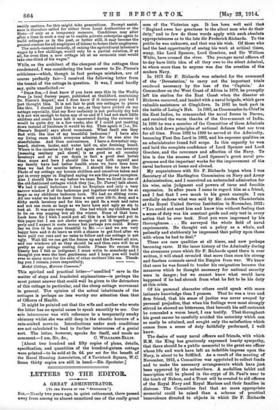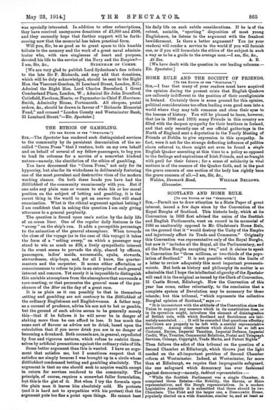LETTERS TO THE EDITOR.
men of the Victorian age. It has been well said that " England owes her greatness to the silent men who do their duty," and to few do these words apply with such absolute appropriateness as to the late Sir Frederick Richards. To the public he was unknown, and that was his wish. Of those who had the best opportunity of seeing his work at critical times, many, like Lord Spencer, Lord Goschen, and Sir William White, have crossed the river. The younger naval officers of to-day have little idea of all they owe to the silent Admiral, to whom more than to anyone was due the creation of the modern Navy.
In 1873 Sir F. Richards was selected for the command of the 'Devastation,' to carry out the important trials rendered necessary by the loss of the ' Captain.' As Commodore on the West Coast of Africa in 1879, he promptly left his station for the East Coast when the disaster at Etchowe occurred, and landed with a naval brigade, which gave valuable assistance at Ginghilovo. In 1881 be took part in the battle of Laing's Nek. In 1885, as Commander-in-Chief in the East Indies, he commanded the naval forces in Burma, and received the warm thanks of the Government of India. In 1888 be was a member of the Committee of three Admirals which laid down principles of national defence that are true for all time. From 1892 to 1899 he served at the Admiralty, becoming First Sea Lord in 1893, and his supreme qualities as an administrator found full scope. In this capacity he won and held the complete confidence of Lord Spencer and Lord Goschen, and the reverence and affection of the Navy. To him is due the success of Lord Spencer's great naval pro. gramme and the important works for the improvement of the naval harbours at home and abroad.
My acquaintance with Sir F. Richards began when I was Secretary of the Hartington Commission on Navy and Army Administration, and I conceived an unbounded admiration for his wise, calm judgment and powers of terse and forcible expression. In after years I came to regard him as a friend, and I feel that I owe much to his great example. I can cordially endorse what was said by Mr. Austen Chamberlain at the Royal United Service Institution in November, 1912: You could not meet him and know him without feeling that a sense of duty was his constant guide and only test in every action that he ever took. Next you were impressed by his thoroughness. . . . He surveyed the whole field of naval requirements. He thought out a policy as a whole, and patiently and stubbornly be impressed that policy upon those with whom he had to deal."
These are rare qualities at all times, and now perhaps becoming rarer. If the inner history of the Admiralty daring the strenuous years which Sir F. Richards spent there is ever written, it will stand revealed that more than once his strong and fearless counsels saved the Empire from war. We know that once he was forced to tender his resignation because the measures which he thought necessary for national security were in danger; but we cannot know what would have happened if he had shrunk from what he felt to be his duty at this crisis.
Of his personal character others could speak with more intimate knowledge than I possess. That he was a true and firm friend, that his sense of justice was never swayed by personal prejudice, that when his feelings were most strongly stirred he showed no bitterness, that beneath his self-restraint he concealed a warm heart, I can testify. That throughout his great career he carefully avoided the notoriety which can so easily be attained, and sought only the satisfaction which comes from a sense of duty faithfully performed, I well know.
The desire of many naval officers and friends, with which H.M. the King has graciously expressed hearty sympathy, that there should be a public memorial to the great sea officer whose life and work have left an indelible impress upon the Navy, is about to be fulfilled. As a result of the meeting of November, 1912, a Committee was appointed to collect funds and to make the necessary arrangements which have just been approved by the subscribers. A medallion tablet and inscription will be placed in the crypt of St. Paul's near to the tomb of Nelson, and a Trust will be created to aid officers of the Royal Navy and Royal Marines and their families in distress. The Committee feel that no more appropriate memorial could be raised than a scheme of practical benevolence directed to objects in which Sir F. Richards VMS specially interested. In addition to other subscriptions, they have received anonymous donations of £1,000 and MO, and they earnestly hope that further support will be forth- coming now that the memorial has taken practical form.
Will you, Sir, be so good as to grant space to this humble tribute to the memory and the work of a great naval adminis- trator who, with rare singleness of heart and purpose, devoted his life to the service of the Navy and the Empire P- [We are very glad to pab]ish Lord Sydenham's fine tribute to the late Sir F. Richards, and may add that donations, which will be duly acknowledged, should be sent to the Right Hon. the Viscount Goschen, 21 Lombard Street, Loudon, E.C.; Admiral the Right Hon. Lord Charles Beresford, 1 Great Cumberland Place, London, W.; Admiral Sir John Dumford, Catisfield, Fare ham, Hants; or Paymaster-in-Chief F. Harrison- Smith, Admiralty House, Portsmouth. All cheques, postal orders, &c., should be drawn in favour of " Richards Memorial Fund," and crossed "London County and Westminster Bank, 21 Lombard Street."—ED. Spectator.]















































 Previous page
Previous page